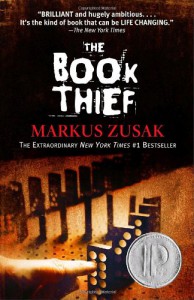The Book Thief May Steal Your Heart.

Death is the narrator. He is omnipresent, omniscient, the great equalizer, most feared and a great relief to many. The fuehrer, Hitler, was the "leader" or "guide". He guided the Nazis to commit heinous crimes and led his countrymen into starvation, degradation, conflagration and despair. We usually read about the horrors that the Jews, the Gypsies, the gays, the communists, the handicapped and other undesirables endured and succombed to.
The Book Thief travels down a different road. It highlights the experiences of a young German girl, Liesel, in a town outside of Munich. She is robbed of her father because of his political actions. Her mother is alienated and impoverished because of his affiliations. Liesel watches her brother die and is abandoned on the same day. Liesel is given to Hans and Rosa, total strangers. They are able to offer the destitute orphan: thin pea soup, quiet encouragement, loud routine and true compassion. Their neighbors, like Scout Finch's (To Kill a Mockingbird ), like yours and mine , are interesting characters who both cause and share pain. She lives on Hummel Street (Heaven Street) which is decidedly on the wrong side of the tracks. The houses are so small and the families so poor, that the children spend their free time outside playing soccer and filching food . Liesel also steals books. Though she can't read when she begins this journey, she learns. This activity sets her free. In fact, Words, is treated as a character. Words become her friend. The words she reads transport her. The words she reads out loud during bombing strikes, soothe her neighbors. They also become a commodity which she trades for coffee.and offers as solace for a neighbor in mourning. Words are hurled, fly, slice, cut, and feed. They become a window for the poor Jew who doesn't ever see the sun, the stars or even a drop of rain or a bit of snow.
Hans and Rosa, her foster parents, are people before they are Germans. They hide Max, a Jew, in their basement. This is a capital offense. Like Boo Radley, Max is hidden away, pale, deprived of sun. Liesel brings him old newspapers and vibrant news from the soccer field and the school. Though Max is pennyless, and fragile, he inspires the German family to be their best selves which may be dangerous and reckless, but keeps them human and heroic. Hans, like Atticus, teaches his daughter to read, to think, to feel, and to be brave by example. Rosa has a clean house, a coarse tongue and a nourishing heart.
Yet death is around every corner. He is tired of greeting the millions of exterminated Jews and other victims of atrocity, broken and disfigured soldiers from around the world, and the Germans, held hostage by their Fuehrer and decimated by starvation, depression and bombings.
This is a satisfying novel because it appeals to the ears, the eyes, the stomach, the nose, the skin and most of all the heart. This is also historical fiction and reminds and teaches about the realities of WW II. Not all Germans were Nazis, yet they were all under the rule of the Reich and many suffered because of his maniacal tyranny.
Zusak's' language is both wonderful and annoying. He uses dynamic and nuanced metaphors and similes for everything, everything. It's overkill. (Not intended as a pun). This is probably called YA because the main character is a young girl. I think many will be sickened by the truths of war, but spell bound by a girl who has been robbed of her family and a carefree childhood, but who has learned to read and write and appreciate this gift.
 4
4



